英语词汇:中国农历春节英语词汇
与春节习俗有关的英语词汇
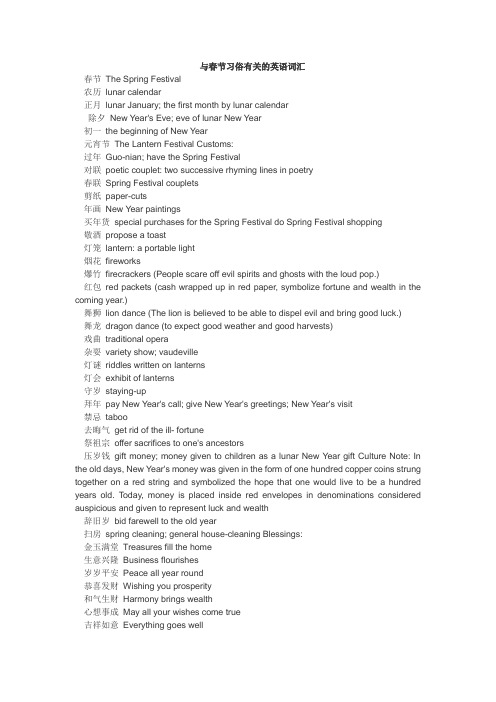
与春节习俗有关的英语词汇春节The Spring Festival农历lunar calendar正月lunar January; the first month by lunar calendar除夕New Year's Eve; eve of lunar New Year初一the beginning of New Year元宵节The Lantern Festival Customs:过年Guo-nian; have the Spring Festival对联poetic couplet: two successive rhyming lines in poetry春联Spring Festival couplets剪纸paper-cuts年画New Year paintings买年货special purchases for the Spring Festival do Spring Festival shopping敬酒propose a toast灯笼lantern: a portable light烟花fireworks爆竹firecrackers (People scare off evil spirits and ghosts with the loud pop.)红包red packets (cash wrapped up in red paper, symbolize fortune and wealth in the coming year.)舞狮lion dance (The lion is believed to be able to dispel evil and bring good luck.)舞龙dragon dance (to expect good weather and good harvests)戏曲traditional opera杂耍variety show; vaudeville灯谜riddles written on lanterns灯会exhibit of lanterns守岁staying-up拜年pay New Year's call; give New Year's greetings; New Year's visit禁忌taboo去晦气get rid of the ill- fortune祭祖宗offer sacrifices to one's ancestors压岁钱gift money; money given to children as a lunar New Year gift Culture Note: In the old days, New Year's money was given in the form of one hundred copper coins strung together on a red string and symbolized the hope that one would live to be a hundred years old. Today, money is placed inside red envelopes in denominations considered auspicious and given to represent luck and wealth辞旧岁bid farewell to the old year扫房spring cleaning; general house-cleaning Blessings:金玉满堂Treasures fill the home生意兴隆Business flourishes岁岁平安Peace all year round恭喜发财Wishing you prosperity和气生财Harmony brings wealth心想事成May all your wishes come true吉祥如意Everything goes well国泰民安The country flourishes and people live in peace招财进宝Money and treasures will be plentiful一帆风顺Wishing you every success步步高升Promoting to a higher position出入平安Safe trip wherever you go祝你新的一年快乐幸福: Wish you happiness and prosperity in the coming year!事业成功,家庭美满: Wish you success in your career and happiness of your family! Food names:年糕Nian-gao; rise cake; New Year cake团圆饭family reunion dinner年夜饭the dinner on New Year's Eve饺子Jiao-zi; Chinese meat ravioli;dumpling汤圆Tang-yuan; dumplings made of sweet rice, rolled into balls and stuffed with either sweet or spicy fillings八宝饭eight treasures rice pudding糖果盘candy tray:什锦糖assorted candies - sweet and fortune蜜冬瓜candied winter melon - growth and good health西瓜子red melon seed - joy, happiness, truth and sincerity金桔cumquat - prosperity糖莲子candied lotus seed - many descendents to come糖藕candied lotus root - fulfilling love relationship红枣red dates - prosperity花生糖peanut candy – sweet【中国新年禁忌】:Dos and Donts of Chinese New YearDo"s:Wish everyone you meet a happy New Year by saying "gong xi fa cai", which translates to: "Have a happy and prosperous New Year!" 对每一个你遇到的人道一声:“恭喜发财”,翻译成英文就是:“在新的一年里拥有幸福繁荣的生活”;Wear articles of red clothing because red symbolizes luck. 穿红色布料做成的饰品,因为红色昭示着幸运;Eat vegetarian food because it"s not good to see blood. 吃素食,因为见血是不吉利的;Buy new trousers because the Chinese word for trousers is "fu", (Chinese homonym for wealth) 买新裤子(衣服),因为汉语里裤子就是“服”,(在汉语里与财富的“富”谐音);Children should stay up as late as possible on New Year"s Eve for it is believed that the later they stay up, the longer their parents will live. 孩子应该在除夕之夜尽可能晚睡、熬夜因为据说他们睡的越晚,他们的父母越长寿;Visit family (especially those older than yourself) and friends to pass on your wishes on good fortune for the New Year. (plus kids and single people will receive lai-see lucky red packets full of money. 拜访亲戚朋友(尤其是比你年长的),传递你对他们来年幸福的美好祝愿(另外孩子和单身的人将会得到装满钱的幸运红包,称为“来喜”.)Give two lai see to each child. Because happiness comes in two"s, do not just give one. Thisis your way of passing good luck tothe next generation. Business owners also give lai see to employees and associates. 给每个孩子两份“来喜”(我觉得应该指钱是偶数的),因为好事成双,不要只给一份.这是你把祝愿传递给下一代的方法.企业主(老板)也要给员工和同事红包.Don"ts:Don"t wear white or black clothing, since they are the traditional colours of mourning. 不要穿白色或黑色服装,因为这是传统意义上丧事的颜色;Don"t buy new shoes for the first month of the New Year, because the sound of shoe in Chinese is "hai". "Hai" is similar to the sound of sighing, which Chinese believe is not a good way to start the year. 不要在新年的第一个月买新鞋,因为在汉语里鞋的发音是“孩”(好像是四川地区的发音), 它与叹息”唉“相近,中国人认为这不是新年伊始的好兆头.Don"t wash your hair for the first three days of the New Year, because the Chinese word for hair is a homonym for the Chinese word for wealth. Therefore, Chinese believe it isn"t a good thing to "wash away your wealth" right at the start of the New Year. 在新年的前三天里不要洗头,因为汉语里“头发”的“发”和“发财”的“发”同音.因此,中国认为在新年伊始把财富给冲走可不是好兆头.Floors may not be swept and garbage may not be disposed of on the first day of the New Year for fear of casting riches out the door. 在新年第一天,不拖地,不扔垃圾,因为怕把"财"给送走了;Don"t swear or quarrel. 不要诅咒发誓,也不愿吵架;Don"t break any dishes, otherwise you may incur more misfortune for the New Year. In the event of breaking a dish, quickly say "Peace for all time", and the bad luck will be warded away. 不要打破碗碟,否则在来年你可能会遭遇不幸.一旦打破了,要马上说“岁岁平安”,这样坏运气就会被赶走了;Don"t greet people who are in mourning. 不要向服丧期的人们问候(主要指不要说喜庆的话吧?)Don"t drop your chopsticks. 不要让筷子掉地上;Don"t say the number "four" (Chinese homonym for death) or mention death. 不要说数字“四”(汉语里和“死”谐音)或者提到死;Don"t borrow or lend money. 不要借钱也不要借给别人钱.。
春节英语词汇汇总

春节英语词汇汇总春节是中国最重要的传统节日之一,承载着丰富的文化内涵和深厚的情感。
在与国际友人交流或学习英语的过程中,了解春节相关的英语词汇是很有必要的。
下面就为大家汇总一些常见的春节英语词汇。
一、节日名称“春节”常见的英语表述有:Spring Festival;Chinese New Year 。
二、庆祝时间春节通常在农历正月初一,但庆祝活动往往从前一年的腊月二十三(小年)就开始了。
“农历”用“lunar calendar”表示;“正月”可以说“the first month of the lunar year”;“初一”则是“the first day of the lunar month”;“小年”是“Minor Spring Festival”或者“Preliminary Eve”。
三、传统习俗1、扫尘(Cleaning the House)春节前,家家户户都会进行大扫除,寓意扫除过去一年的晦气和不幸,迎接新的一年的好运。
2、贴春联(Pasting Spring Couplets)“春联”即“Spring Couplets”,人们会在门口贴上红色的春联,增添喜庆的氛围。
3、贴窗花(Pasting PaperCuts for Windows)精美的窗花也是春节的一大特色,“窗花”用“PaperCuts for Windows”来表达。
4、守岁(Staying Up Late on New Year's Eve)在除夕夜,一家人会团聚在一起,熬夜守岁,等待新年的到来。
“除夕夜”是“New Year's Eve”。
5、吃年夜饭(Having New Year's Eve Dinner)年夜饭是一年中最重要的一餐,家人围坐在一起,共享美食。
6、拜年(Paying New Year Calls)大年初一开始,人们会走亲访友,互相拜年,送上新年的祝福。
7、给压岁钱(Giving Red Envelopes)长辈会给晚辈压岁钱,“压岁钱”就是“Red Envelopes”或“Lucky Money”,希望孩子们在新的一年里健康快乐。
春节词汇英语单词
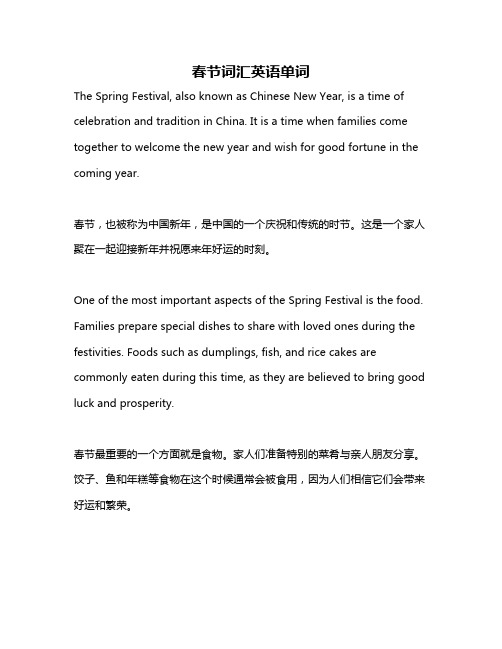
春节词汇英语单词The Spring Festival, also known as Chinese New Year, is a time of celebration and tradition in China. It is a time when families come together to welcome the new year and wish for good fortune in the coming year.春节,也被称为中国新年,是中国的一个庆祝和传统的时节。
这是一个家人聚在一起迎接新年并祝愿来年好运的时刻。
One of the most important aspects of the Spring Festival is the food. Families prepare special dishes to share with loved ones during the festivities. Foods such as dumplings, fish, and rice cakes are commonly eaten during this time, as they are believed to bring good luck and prosperity.春节最重要的一个方面就是食物。
家人们准备特别的菜肴与亲人朋友分享。
饺子、鱼和年糕等食物在这个时候通常会被食用,因为人们相信它们会带来好运和繁荣。
Another important tradition during the Spring Festival is the giving of red envelopes, or "hong bao." These envelopes are filled with money and given to children and unmarried adults as a symbol of good luck and prosperity in the coming year.春节期间另一个重要的传统是赠送红包。
春节农历除夕词汇
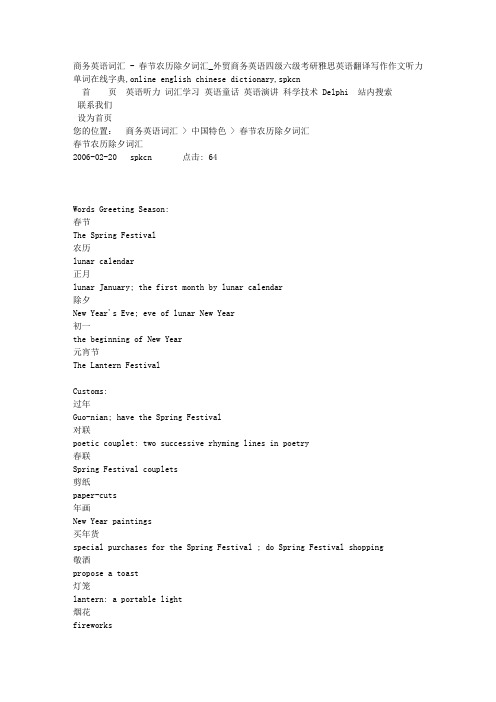
商务英语词汇 - 春节农历除夕词汇_外贸商务英语四级六级考研雅思英语翻译写作作文听力单词在线字典,online english chinese dictionary,spkcn首页英语听力词汇学习英语童话英语演讲科学技术 Delphi 站内搜索联系我们设为首页您的位置:商务英语词汇 > 中国特色 > 春节农历除夕词汇春节农历除夕词汇2006-02-20 spkcn 点击: 64Words Greeting Season:春节The Spring Festival农历lunar calendar正月lunar January; the first month by lunar calendar除夕New Year's Eve; eve of lunar New Year初一the beginning of New Year元宵节The Lantern FestivalCustoms:过年Guo-nian; have the Spring Festival对联poetic couplet: two successive rhyming lines in poetry春联Spring Festival couplets剪纸paper-cuts年画New Year paintings买年货special purchases for the Spring Festival ; do Spring Festival shopping敬酒propose a toast灯笼lantern: a portable light烟花fireworks爆竹firecrackers (People scare off evil spirits and ghosts with the loud pop.)红包red packets (cash wrapped up in red paper, symbolize fortune and wealth in the coming year.)舞狮lion dance (The lion is believed to be able to dispel evil and bring good luck.) 舞龙dragon dance (to expect good weather and good harvests)戏曲traditional opera杂耍variety show; vaudeville灯谜riddles written on lanterns灯会exhibit of lanterns守岁staying-up拜年pay New Year's call; give New Year's greetings; New Year's visit禁忌taboo去晦气get rid of the ill- fortune祭祖宗offer sacrifices to one's ancestors压岁钱gift money; money given to children as a lunar New Year giftCulture Note: In the old days, New Year's money was given in the form of one hundred copper coins strung together on a redstring and symbolized the hope that one would live to be a hundred years old. Today, money is placed inside red envelopesin denominations considered auspicious and given to represent luck and wealth辞旧岁bid farewell to the old year扫房spring cleaning; general house-cleaningBlessings:Treasures fill the home金玉满堂Business flourishes生意兴隆Peace all year round岁岁平安Wishing you prosperity恭喜发财Harmony brings wealth和气生财May all your wishes come true心想事成Everything goes well吉祥如意The country flourishes and people live in peace国泰民安Money and treasures will be plentiful招财进宝Wishing you every success一帆风顺Promoting to a higher position步步高升Safe trip wherever you go出入平安祝你新的一年快乐幸福: Wish you happiness and prosperity in the coming year事业成功,家庭美满: Wish you success in your career and happiness of your family!Food names:年糕Nian-gao; rise cake; New Year cake团圆饭family reunion dinner年夜饭the dinner on New Year's Eve饺子Jiao-zi; Chinese meat ravioli汤圆Tang-yuan; dumplings made of sweet rice, rolled into balls and stuffed with either sweet or spicy fillings八宝饭eight treasures rice pudding糖果盘candy tray:什锦糖assorted candies - sweet and fortune蜜冬瓜candied winter melon - growth and good health西瓜子red melon seed - joy, happiness, truth and sincerity金桔cumquat - prosperity糖莲子candied lotus seed - many descendents to come糖藕candied lotus root - fulfilling love relationship红枣red dates - prosperity花生糖peanut candy - sweetCopyright © 2005-2010 商务英语词汇, Inc. All Rights Reserved.版权声明:未经本站许可,任何人不得复制本站内容。
五年级英语下册素材-Unit7 Chinese festivals知识点梳理 译林版(三起)
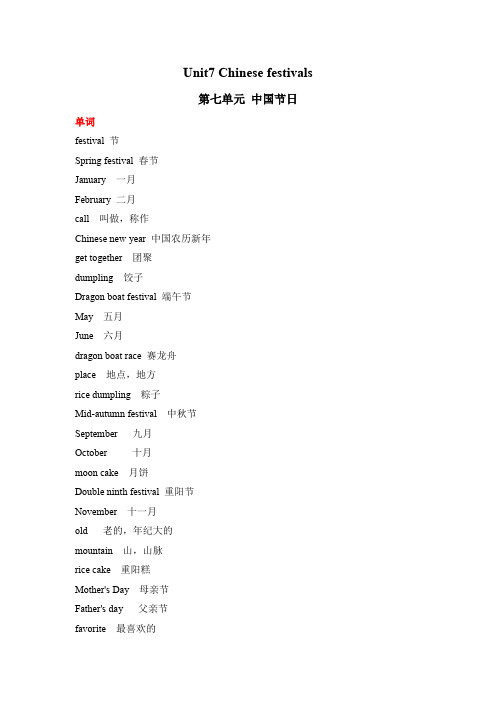
Unit7 Chinese festivals第七单元中国节日单词festival 节Spring festival 春节January 一月February 二月call 叫做,称作Chinese new year 中国农历新年get together 团聚dumpling 饺子Dragon boat festival 端午节May 五月June 六月dragon boat race 赛龙舟place 地点,地方rice dumpling 粽子Mid-autumn festival 中秋节September 九月October 十月moon cake 月饼Double ninth festival 重阳节November 十一月old 老的,年纪大的mountain 山,山脉rice cake 重阳糕Mother's Day 母亲节Father's day 父亲节favorite 最喜欢的重点内容重点短语:in January 在一月get together 团聚eat dumplings 吃饺子look at 看at night 在晚上eat mooncakes 吃月饼climb mountains 爬山rice dumplings 粽子Mother's Day 母亲节talk about 谈论what about 怎么样a good idea 一个好主意come home 回家惯用语:That's a good idea! 那是一个好主意!Happy Mother's Day! 母亲节快乐!Thank you! 谢谢你们!知识点精析1. 表达某个节日在几月的句型一….is in…【课文应用】The Spring Festival is in January or February.春节在一月或者二月。
【句型结构】节日名称十is in+月份.【重点解析】因句子时态为一般现在时,某个节日名称作主语,be动词要用is 【生活实例】过春节了,Lily高兴地放鞭炮、吃饺子,这是她最喜欢的节日,让我们看看地说了什么:Lily: The Spring Festival is in February this year.今年春节在二月。
关于春节的英语表达
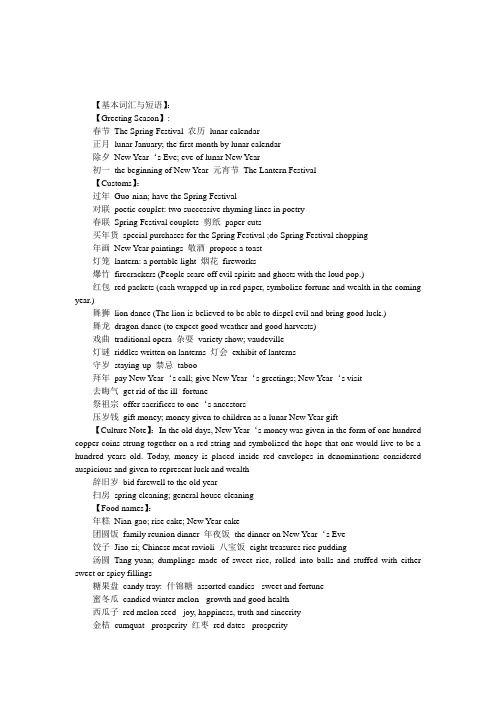
【基本词汇与短语】:【Greeting Season】:春节The Spring Festival 农历lunar calendar正月lunar January; the first month by lunar calendar除夕New Year‘s Eve; eve of lunar New Year初一the beginning of New Year 元宵节The Lantern Festival【Customs】:过年Guo-nian; have the Spring Festival对联poetic couplet: two successive rhyming lines in poetry春联Spring Festival couplets 剪纸paper-cuts买年货special purchases for the Spring Festival ;do Spring Festival shopping年画New Year paintings 敬酒propose a toast灯笼lantern: a portable light 烟花fireworks爆竹firecrackers (People scare off evil spirits and ghosts with the loud pop.)红包red packets (cash wrapped up in red paper, symbolize fortune and wealth in the coming year.)舞狮lion dance (The lion is believed to be able to dispel evil and bring good luck.)舞龙dragon dance (to expect good weather and good harvests)戏曲traditional opera 杂耍variety show; vaudeville灯谜riddles written on lanterns 灯会exhibit of lanterns守岁staying-up 禁忌taboo拜年pay New Year‘s call; give New Year‘s greetings; New Year‘s visit去晦气get rid of the ill- fortune祭祖宗offer sacrifices to one‘s ancestors压岁钱gift money; money given to children as a lunar New Year gift【Culture Note】:In the old days, New Year‘s money was given in the form of one hundred copper coins strung together on a red string and symbolized the hope that one would live to be a hundred years old. Today, money is placed inside red envelopes in denominations considered auspicious and given to represent luck and wealth辞旧岁bid farewell to the old year扫房spring cleaning; general house-cleaning【Food names】:年糕Nian-gao; rise cake; New Year cake团圆饭family reunion dinner 年夜饭the dinner on New Year‘s Eve饺子Jiao-zi; Chinese meat ravioli 八宝饭eight treasures rice pudding汤圆Tang-yuan; dumplings made of sweet rice, rolled into balls and stuffed with either sweet or spicy fillings糖果盘candy tray: 什锦糖assorted candies - sweet and fortune蜜冬瓜candied winter melon - growth and good health西瓜子red melon seed - joy, happiness, truth and sincerity金桔cumquat - prosperity 红枣red dates - prosperity糖莲子candied lotus seed - many descendents to come糖藕candied lotus root - fulfilling love relationship花生糖peanut candy - sweet【Blessing】:Treasures fill the home 财源广进Business flourishes 事业兴隆Peace all year round 岁岁平安Wishing you prosperity 恭喜发财Harmony brings wealth 家和万事兴May all your wishes come true 心想事成Everything goes well 万事如意The country flourishes and people live in peace 国家富强、人民安康Money and treasures will be plentiful 财源茂盛Wishing you every success Promoting to a higher position 事业有成、更上一层楼、蒸蒸日上Safe trip wherever you go 一帆风顺Wish you happiness and prosperity in the coming year! 祝你新的一年快乐幸福Wish you success in your career and happiness of your family! 事业成功,家庭美满(阖家欢乐)【中国新年禁忌】:Dos and Donts of Chinese New YearDo"s:Wish everyone you meet a happy New Year by saying "gong xi fa cai", which translates to: "Have a happy and prosperous New Year!" 对每一个你遇到的人道一声:“恭喜发财”,翻译成英文就是:“在新的一年里拥有幸福繁荣的生活”;Wear articles of red clothing because red symbolizes luck. 穿红色布料做成的饰品,因为红色昭示着幸运;Eat vegetarian food because it"s not good to see blood. 吃素食,因为见血是不吉利的;Buy new trousers because the Chinese word for trousers is "fu", (Chinese homonym for wealth) 买新裤子(衣服),因为汉语里裤子就是“服”,(在汉语里与财富的“富”谐音);Children should stay up as late as possible on New Year"s Eve for it is believed that the later they stay up, the longer their parents will live. 孩子应该在除夕之夜尽可能晚睡、熬夜因为据说他们睡的越晚,他们的父母越长寿;Visit family (especially those older than yourself) and friends to pass on your wishes on good fortune for the New Year. (plus kids and single people will receive lai-see lucky red packets full of money. 拜访亲戚朋友(尤其是比你年长的),传递你对他们来年幸福的美好祝愿(另外孩子和单身的人将会得到装满钱的幸运红包,称为“来喜”。
春节英文词
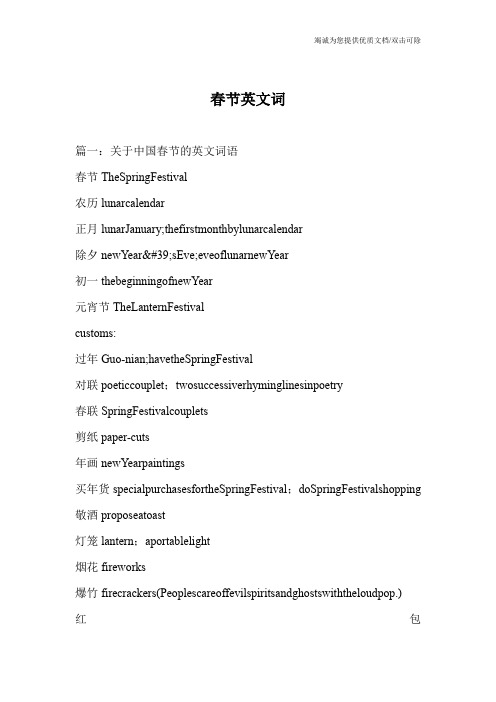
春节英文词篇一:关于中国春节的英文词语春节TheSpringFestival农历lunarcalendar正月lunarJanuary;thefirstmonthbylunarcalendar除夕newYear'sEve;eveoflunarnewYear初一thebeginningofnewYear元宵节TheLanternFestivalcustoms:过年Guo-nian;havetheSpringFestival对联poeticcouplet;twosuccessiverhyminglinesinpoetry春联SpringFestivalcouplets剪纸paper-cuts年画newYearpaintings买年货specialpurchasesfortheSpringFestival;doSpringFestivalshopping 敬酒proposeatoast灯笼lantern;aportablelight烟花fireworks爆竹firecrackers(Peoplescareoffevilspiritsandghostswiththeloudpop.)红包redpackets(cashwrappedupinredpaper,symbolizefortuneandwealthintheco mingyear.)舞狮liondance(Thelionisbelievedtobeabletodispelevilandbringgoodluck.) 舞龙dragondance(toexpectgoodweatherandgoodharvests)戏曲traditionalopera杂耍varietyshow;vaudeville灯谜riddleswrittenonlanterns灯会exhibitoflanterns守岁staying-up(直译为熬夜)拜年paynewYear'scall;givenewYear'sgreetings;newYear'svisi t禁忌taboo去晦气getridoftheill-fortune祭祖宗offersacrificestoone'sancestors压岁钱giftmoney;moneygiventochildrenasalunarnewYeargift辞旧岁bidfarewelltotheoldyear扫房springcleaning;generalhouse-cleaning篇二:春节英语词汇汇总有关春节的英语词汇、风俗习惯和祝福语。
教你如何用英语介绍春节~

【导语】春节要到了,来提前渲染⼀下⽓氛吧!除⼣、拜年、春联、春晚、庙会、压岁钱、中国结…年味⼗⾜的春节英⽂⼩知识,给外国朋友介绍中国传统⽂化时⽤得上!欢迎阅读参考!更多相关讯息请关注⽆忧考!春节的英语介绍 春节,也被称为农历新年。
对于中国⼈来说,这是规模,最重要的传统节⽇。
就如同西⽅的圣诞节⼀样,春节是⼀家团聚的⽇⼦。
The Spring Festival is also called Chinese Lunar New Year. Being one of the traditional Chinese festivals, it is the grandest and most important festival for Chinese people. It is also the time for whole families to get together, which is similar to Christmas for Westerners. 春节从农历新年第⼀天开始,⼏乎要持续半个⽉。
但在民间传统中,这⼀节⽇从腊⽉23⽇就开始了,⼀直到正⽉⼗五(元宵节)。
It comes on the first day of Chinese lunar calendar and lasts for almost half of a month. But in folk custom, this traditional holiday lasts from the 23rd day of the twelfth month to the 15th day of the first month (The Lantern Festival) on the lunar calendar.春节习俗如何⽤英语介绍? ⼤年三⼗:团圆饭 就除⼣夜⽽⾔,⽆论⾝在何处,也不管路途多么遥远,⼈们都会设法赶回家,所以除⼣夜的盛⼤晚餐也叫做“团圆饭”。
- 1、下载文档前请自行甄别文档内容的完整性,平台不提供额外的编辑、内容补充、找答案等附加服务。
- 2、"仅部分预览"的文档,不可在线预览部分如存在完整性等问题,可反馈申请退款(可完整预览的文档不适用该条件!)。
- 3、如文档侵犯您的权益,请联系客服反馈,我们会尽快为您处理(人工客服工作时间:9:00-18:30)。
英语词汇:中国农历春节英语词汇Spring Festival WordsGreeting Season:春节 The Spring Festival农历 lunar calendar正月 lunar January; the first month by lunar calendar除夕 New Year's Eve; eve of lunar New Year初一 the beginning of New Year元宵节 The Lantern FestivalCustoms:过年 Guo-nian; have the Spring Festival对联poetic couplet: two successive rhyming lines in poetry春联 Spring Festival couplets剪纸 paper-cuts年画 New Year paintings买年货special purchases for the Spring Festival ; do Spring Festival shopping敬酒 propose a toast灯笼 lantern: a portable light烟花 fireworks爆竹firecrackers (People scare off evil spirits and ghosts with the loud pop.)红包 red packets (cash wrapped up in red paper, symbolize fortune and wealth in the coming year.)舞狮 lion dance (The lion is believed to be able to dispel evil and bring good luck.)舞龙dragon dance (to expect good weather and good harvests)戏曲 traditional opera杂耍 variety show; vaudeville灯谜 riddles written on lanterns灯会 exhibit of lanterns守岁 staying-up拜年 pay New Year's call; give New Year's greetings; New Year's visit禁忌 taboo去晦气 get rid of the ill- fortune祭祖宗 offer sacrifices to one's ancestors压岁钱 gift money; money given to children as a lunar New Year giftCulture Note: In the old days, New Year's money was given in the form of one hundred copper coins strung together on a red string and symbolized the hope that one would live to be a hundred years old. Today, money is placed inside red envelopes in denominations considered auspicious and given to represent luck and wealth辞旧岁 bid farewell to the old year扫房 spring cleaning; general house-cleaningBlessings:金玉满堂 Treasures fill the home生意兴隆 Business flourishes岁岁平安 Peace all year round恭喜发财 Wishing you prosperity和气生财 Harmony brings wealth心想事成 May all your wishes come true吉祥如意 Everything goes well国泰民安 The country flourishes and people live in peace招财进宝 Money and treasures will be plentiful一帆风顺 Wishing you every success步步高升 Promoting to a higher position出入平安 Safe trip wherever you go祝你新的一年快乐幸福: Wish you happiness and prosperity in the coming year!事业成功,家庭美满: Wish you success in your career and happiness of your family!Food names:年糕 Nian-gao; rise cake; New Year cake团圆饭 family reunion dinner年夜饭 the dinner on New Year's Eve饺子 Jiao-zi; Chinese meat ravioli汤圆 Tang-yuan; dumplings made of sweet rice, rolled into balls and stuffed with either sweet or spicy fillings八宝饭 eight treasures rice pudding糖果盘 candy tray:什锦糖 assorted candies - sweet and fortune蜜冬瓜 candied winter melon - growth and good health西瓜子 red melon seed - joy, happiness, truth and sincerity金桔 cumquat - prosperity糖莲子 candied lotus seed - many descendents to come糖藕 candied lotus root - fulfilling love relationship红枣 red dates - prosperity花生糖 peanut candy – sweettraditions of chinese new yearbefore new year's evethe celebration actually starts on new year's eve with the family reuniondinner. by new year's eve, you should have done the following:clean the entire home to get rid of all the things that are associated with the old year. put away all brooms and brushes. pay all your debts. resolve differences with family members, friends, neighbors and business associates. buy the following: red money envelopes,oranges and/or tangerines,fill a "cheun hup(a circular red tray separated in eight compartments) with melon seedslotuschocolate coinsnuts etc. flowers (especially plum blossoms, peach blossoms, water lilies), a new set of clothes and shoes for children, preferably something red or orange. get new dollar bills from the bank. insert the new dollar bills into the red envelopes. now the red envelope is called a lai see or lucky money envelope.on new year's eveget together with close family members (not including married daughters and their families) for the "reunion" dinner.pay respect to ancestors and household gods. acknowledge the presence of ancestors because they are responsible for the fortunes of future generations. open every door and window in your home at midnight to let go of the old year.on new year's daydecorate your home with symbols of good fortune. here are some suggestions:colors: bright red (happiness); gold/orange (wealth & happiness).fruits: oranges and tangerines (good health & long life); tangerines with leaves intact (long lasting relationships; being fruitful and multiply); persimmons (happiness and wealth)."chuen hup" circular candy tray (candy for sweet and circular for togetherness and continuity).flowers: if flowers bloom on new year's day, it will be a prosperous year. red banners or couplets with new year wishes and symbols of good fortune in gold.第三篇spring festival the spring festival is the most important festival for the chinese people and is when all family members get together, just like christmas in the west. all people living away from home go back, becoming the busiest time for transportation systems of about half a month from the spring festival. airports, railway stations and long-distance bus stations are crowded with home returnees.the spring festival falls on the 1st day of the 1st lunar month, often one month later than the gregorian calendar. it originated in the shang dynasty (c. 1600 bc-c. 1100 bc) from the people's sacrifice to gods and ancestors at the end of an old year and the beginning of a new one.strictly speaking, the spring festival starts every year in the early days of the 12th lunar month and will last till the mid 1st lunar month of the next year. of them, the most important days are spring festival eve and the first three days. the chinese government now stipulates people have seven days off for the chinese lunar new year.many customs accompany the spring festival. some are still followed today, but others have weakened.on the 8th day of the 12th lunar month, many families make laba porridge, a delicious kind of porridge made with glutinous rice, millet, seeds of job's tears, jujube berries, lotus seeds, beans, longan and gingko.the 23rd day of the 12th lunar month is called preliminary eve. at this time, people offer sacrifice to the kitchen god. now however, most families make delicious food to enjoy themselves.after the preliminary eve, people begin preparing for the coming new year. this is called "seeing the new year in".store owners are busy then as everybody goes out to purchase necessities for the new year. materials not only include edible oil, rice, flour, chicken, duck, fish and meat, but also fruit, candies and kinds of nuts. what's more, various decorations, new clothes and shoes for the children as well as gifts for the elderly, friends and relatives, are all on the list of purchasing.before the new year comes, the people completely clean the indoors and outdoors of their homes as well as their clothes, bedclothes and all their utensils.then people begin decorating their clean rooms featuring an atmosphere of rejoicing and festivity. all the door panels will be pasted with spring festival couplets, highlighting chinese calligraphy with black characters on red paper. the content varies from house owners' wishes for a bright future to good luck for the new year. also, pictures of the god of doors and wealth will be posted on front doors to ward off evil spirits and welcome peace and abundance. the chinese character "fu" (meaning blessing or happiness) is a must. the character put on paper can be pasted normally or upside down, for in chinese the "reversed fu" is homophonic with "fu comes", both being pronounced as "fudaole." what's more, two big red lanterns can be raised on both sides of the front door. red paper-cuttings can be seen on window glass and brightly colored new year paintings with auspicious meanings may be put on the wall. people attach great importance to spring festival eve. at that time, all family members eat dinner together. the meal is more luxurious than usual. dishes such as chicken, fish and bean curd cannot be excluded, for in chinese, their pronunciations, respectively "ji", "yu" and "doufu," mean auspiciousness, abundance and richness. after the dinner, the whole family will sit together, chatting and watching tv. in recent years, the spring festival party broadcast on china central television station (cctv) is essential entertainment for the chinese both at home and abroad. according to custom, each family will stay up to see the new year in.waking up on new year, everybody dresses up. first they extend greetings to their parents. then each child will get money as a new year gift, wrapped up in red paper. people in northern china will eat jiaozi, or dumplings, for breakfast, as they think "jiaozi" in sound means "bidding farewell to the old and ushering in the new". also, the shape of the dumpling is like gold ingot from ancient china. so people eat them and wish for money and treasure. southern chinese eat niangao (new year cake made of glutinous rice flour) onthis occasion, because as a homophone, niangao means "higher and higher, one year after another." the first five days after the spring festival are a good time for relatives, friends, and classmates as well as colleagues to exchange greetings, gifts and chat leisurely.burning fireworks was once the most typical custom on the spring festival. people thought the spluttering sound could help drive away evil spirits. however, such an activity was completely or partially forbidden in big cities once the government took security, noise and pollution factors into consideration. as a replacement, some buy tapes with firecracker sounds to listen to, some break little balloons to get the sound too, while others buy firecracker handicrafts to hang in the living room.the lively atmosphere not only fills every household, but permeates to streets and lanes. a series of activities such as lion dancing, dragon lantern dancing, lantern festivals and temple fairs will be held for days. the spring festival then comes to an end when the lantern festival is finished.china has 56 ethnic groups. minorities celebrate their spring festival almost the same day as the han people, and they have different customs.。
